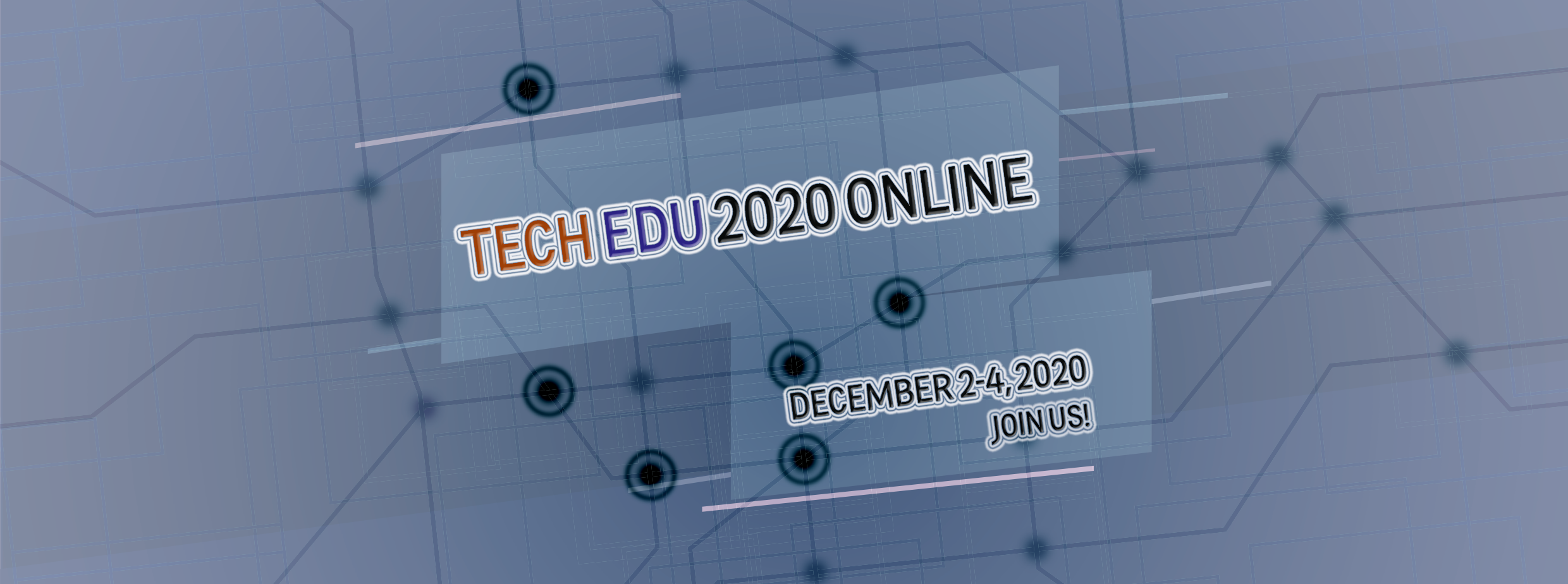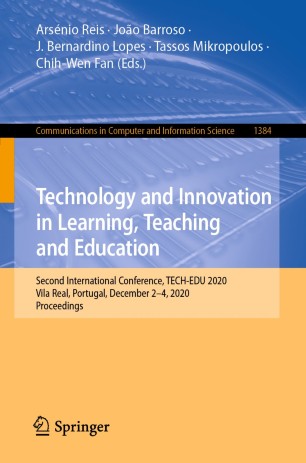Accepted Papers
Paper Session TE1: Main Track
Chair: Arsénio Reis
Room C – 2 December | 11h30m – 13h00m
A proposal for an educational game platform for teaching programming to primary school students
Andreas Giannakoulas, George Terzopoulos, Stelios Xinogalos, Maya Satratzemi
Future Teachers choose ideal characteristics for robot peer-tutor in real class environment
Anna Maria Velentza, Sofia Pliasa, Nikolaos Fachantidis
Creative process for designing a hybrid game for nutrition education
Pedro Reisinho, Cátia Silva, Nelson Zagalo, Mário Vairinhos, Ana Patrícia Oliveira
Motivating students to learn computer programming in higher education: the SimProgramming approach
Ricardo Rodrigues Nunes, Gonçalo Cruz, Daniela Pedrosa, Ana Margarida Maia, Leonel Morgado, Hugo Paredes, José Cravino, Paulo Martins
A Proposal of a Classification Scheme to a Survey of Augmented Reality for Education and Training
Armando Cruz, Hugo Paredes, Paulo Martins
Paper Session TE2: Transforming teaching and learning through collaboration and mobility (ST4)
Chairs: Sandra Vasconcelos, Ana Balula
Room C – 2 December | 15h00m – 16h30m
The potential of Audiovisual Online Collaborative Platforms as a teaching/learning aid of ESP – testing and validating a prototype
Tiago da Silva Carvalho
Bring the social media to the classroom of Portuguese as a Foreign Language in China: possibilities and challenges
Yuxiong Zhang, António Moreira
Creating collaborative research opportunities at a distance: From Porto to Cluj-Napoca
Carla Melo, Sandra Vasconcelos, Dalia Liberato, Candida Silva, Paula Amaral, Adina Negrusa, Cristina Fleseriu, Smaranda Cosma
Technology-Supported Collaborative Learning in Lan-guage Teaching
Giedre Valunaite Oleskeviciene, Liudmila Mockiene, Viktorija Mazeikiene
Digital platforms in The Age of Mobility: A Contribution Towards Collaborative Language Teaching and Learning
Sandra Vasconcelos, Ana Balula
Paper Session TE3: The effect of Covid-19 in the Educational ecosystem: Lessons learnt (ST2)
Chairs: Sofia Hadjileontiadou, Sofia Balula Dias, Leontios Hadjileontiadis
Room D – 2 December | 15h00m – 16h30m
Yes, We Can (?) – A Critical Review of the COVID-19 Semester
Gergana Vladova, Andre Ullrich, Benedict Bender, Norbert Gronau
Designing Didactic Cycles in a Pandemic Scenario
Sonia Martins
FuzzyQoI-based estimation of the Quality of Interaction in online learning amid Covid-19: A Greek case-study
Sofia Dias, Sofia Hadjileontiadou, Diniz Alves, Leontios Hadjileontiadis
Design teaching and learning in covid-19 times: an international experience.
Paulo Ferreira
Paper Session TE4: Using digital technologies to foster critical thinking in higher education: how would you do it? (ST5)
Chairs: Caroline Dominguez, Maria M. Nascimento, Gonçalo Cruz
Room C – 3 December | 10h30m – 12h00m
Structuring International University Students´ Reflection And Meta-Reflection Experiences Online
Chrysi Rapanta, Carlotta Pisano
Critical Thinking on Mathematics in Higher Education: Two Experiences
Vanda Santos, Nuno Bastos
Cooperative Learning and Critical Thinking in face to face and online environments
Eva Morais, Helena Silva, Jose Lopes, Caroline Dominguez
Teaching Strategies to promote Critical Thinking Skills in an Online Learning Environment
Angeliki Lithoxoidou, Catherine Dimitriadou
Paper Session TE5: Process Mining in Education (PMEd) (ST7)
Chairs: Vitor Santos, José Luís Pereira
Room C – 3 December | 15h00m – 16h30m
The Effect of Agency on Cognitive Load in Dyads Learning Physics with a Serious Computer Game
Julien Mercier, Ariane Paradis, Ivan Avaca, Kathleen Whissell-Turner
Towards Modeling the Psychophysiology of Learning Interactions: The Effect of Agency on Arousal in Dyads Learning Physics with a Serious Computer Game
Julien Mercier, Ivan Avaca, Kathleen Whissell-Turner, Ariane Paradis
Support Tool for the Visualization of Non-Conformities in Vehicle Production Quality Control
Ana Teresa Campaniço, Salik Khanal, Hugo Paredes
Students Drop Out Trends: a university study
Bruno Silva, Solteiro Pires, Arsénio Reis, Paulo Moura Oliveira, João Barroso
Visualization of scientific phenomena for education
Roman Rudenko, Arsénio Reis, José Sousa, João Barroso
Paper Session TE6: Emergency Remote Teaching, e-Learning and Blended Learning: Exploring common aspects, challenges and opportunities in the midst of the COVID-19 pandemic (ST3)
Chair: Athanassios Jimoyiannis
Room D – 3 December | 15h00m – 16h30m
Communicating Mathematics during Small Groupwork through Video-Conferencing Applications
Raymond LaRochelle, Michelle Cirillo, Dawn Berk
Engaging students during synchronous video-conferencing in COVID19 times preliminary findings from a design study
Ilias Karasavvidis
Social presence, satisfaction, and learning outcomes in an undergraduate computer programming distance course
George Koutromanos, Ioanna Bellou, Tassos Mikropoulos
E-assessment and Academic Integrity: A Literature Review.
Theologos Tsigaros, George Fesakis
Shifting to emergency remote teaching due to the COVID-19 pandemic: Greek teachers’ beliefs and experiences
Athanassios Jimoyiannis, Nikolaos Koukis, Panagiotis Tsiotakis
Rapid design and implementation of a teacher development MOOC about emergency remote teaching during the pandemic
Athanassios Jimoyiannis, Nikolaos Koukis, Panagiotis Tsiotakis
SciLOET: a framework for assessing digital learning objects for Science Education
Tassos Mikropoulos, Nikiforos Papachristos
Paper Session TE7: Digital tools to improve STEM learning (ST1-1)
Chairs: J. Bernardino Lopes, Cecília Costa
Room C – 4 December | 10h30m – 12h00m
The use of Kahoot, GeoGebra and Texas Ti-Nspire Educational Software´s in the Teaching of Geometry and Measurement
Paula Sofia Nunes, Paulo Martins, Paula Catarino
Exploring the potential of the outdoors with digital technology in teacher education
Ana Barbosa, Isabel Vale
Computational Simulations in the Construction of Abstract Concepts and in Promoting of Students Autonomy in the 5th Grade
Fátima Maria Araújo, Joaquim Bernardino Lopes, Armando Soares, José Paulo Cravino
Instrumental orchestrations in a math teacher´s practices to enhance distance learning of integral calculus
Carlos Monteiro, Cecília Costa
Using Mathematical Modelling and Virtual Manipulatives to teach elementary mathematics
Ricardo Silva, Fernando Martins
Paper Session TE8: Digital tools to improve STEM learning (ST1-2)
Chairs: J. Bernardino Lopes, Cecília Costa
Room C – 4 December | 15h00m – 16h00m
Digital Tools Entering the Scene in STEM Activities for Physics Teaching
Carla Morais, Luciano Moreira, Monica Baptista, Iva Martins
How digital resources can be used as epistemic tools enhancing STEM learning
Bernardino Lopes, Cecília Costa
BiblioLab project: teachers, parents and students´ perspectives about the usability and usefulness of an educational distance learning platform.
Joana Rocha, Patrícia Pessoa, Xana Pinto, José Gomes, Joaquim Lopes
Doing Math with Music – Instrumental Orchestration
Ana Silva, Joaquim Lopes, Maria Costa
Paper Session TE9: Tools for monitoring Self and Co-Regulation of e-learning (Tools for SCRL) (ST6)
Chairs: Daniela Cristina Carneiro Pedrosa, José Paulo Cravino, Leonel Caseiro Morgado
Room D – 4 December | 15h00m – 16h00m
The Diagnostic Assessment and Achievement of College Skills (DAACS)- A Powerful Tool for the Regulation of Learning
Elie ChingYen Yu, Angela M. Lui, Diana Akhmedjanova
Drill-down Dashboard for Coordination of Master Programmes in Engineering
Anabela Silva, Leonel Morgado, António Coelho
Using BPMN to identify indicators for teacher intervention in support of self-regulation and co-regulation of learning in asynchronous e-learning
Ceres Morais, Daniela Pedrosa, Vitor Rocio, José Cravino, Leonel Morgado,


